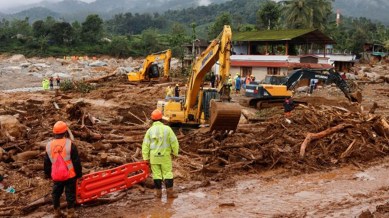Stay updated with the latest - Click here to follow us on Instagram
In devastated villages, ambulances bring the dead, funeral prayers on
Kavungal Hamza, 60, from Chooralmala – one of the worst hit villages – had a narrow escape along with his wife and children. He doesn't want to go back to his village, he says.

Over 24 hours since massive landslides struck the hills of Meppadi panchayat in Kerala’s Wayanad district, the torrent of mud and water has receded to bare scenes of devastation — mass burials and relief shelters with people who have no homes to go back to.
At the hillock burial ground of the Juma Masjid in Wayanad’s Meppadi, funeral prayers have been ringing out ceaselessly since Tuesday. Here, around 50 volunteers drawn from various mahallu committees have been digging graves, preparing to find a resting place for the unending stream of bodies brought in by ambulances.
The landslides that swept through several villages of Wayanad early Tuesday morning left at least 174 dead. Most of the victims at this burial ground are from Mundakkai and Chooralmala, two villages in Meppadi panchayat, where entire families and even neighbourhoods have been wiped off.
According to Juma Masjid Committee Vice-President Musthafa Moulavi, 30 bodies have already been buried and volunteers are digging 50 more graves. Three to four graves are being prepared in a single pit for the burial of families, he said.
Manaf, a volunteer, is helping bury those who have no family or relatives left to mourn. “We don’t want these people to leave the world as orphans, so we are standing in for their relatives in their final journey,” he said.
Metres away, at the Meppadi school that serves as a relief camp, those who survived the landslide now face an uncertain future — many of them have lost almost everything they owned.
Kavungal Hamza, 60, from Chooralmala, one of the worst-hit villages, narrowly escaped the landslide. Sitting with his wife and children in the relief shelter, he says, “My house was completely destroyed. Not a single brick is left on our small plot of land. My children have lost their school books. We have lost all our household items. At this age, how can I rebuild my life?” says Hamza, who works as a driver.
Hamza’s was among the few families from Chooralmala to have escaped to safer locations before the landslide struck. Before getting to a relief camp on Wednesday, Hamza, his wife Jameela, and their two children had taken shelter in a small shed on a hill for the previous two nights. “I don’t know where to go. It was only five years ago that I built my house with all my savings. Now, I can’t build another one,” he says.
Farm labourer Ajitha T, 50, from Mundakkai, too, has no home to go back to. “My house cannot be rebuilt. We are afraid of going back to the village. How long can we stay in this school? There is no place to return to,” she says.
Zeenath, 50, a daily-wage worker, survived the landslides as she had gone to a relative’s home just before the disaster. “I survived, but lost my house and all the belongings that I had toiled so hard for. There is nothing left for me here,” she says.
People continue to pour into the relief camp, where food and basic survival material are being provided by government agencies and volunteer groups.
Bindu, who is part of a group of teachers distributing clothes to the survivors, says, “Most of the survivors have no clothes other than what they are wearing now. So, we mobilised used clothes from Meppadi, and people contributed generously.”